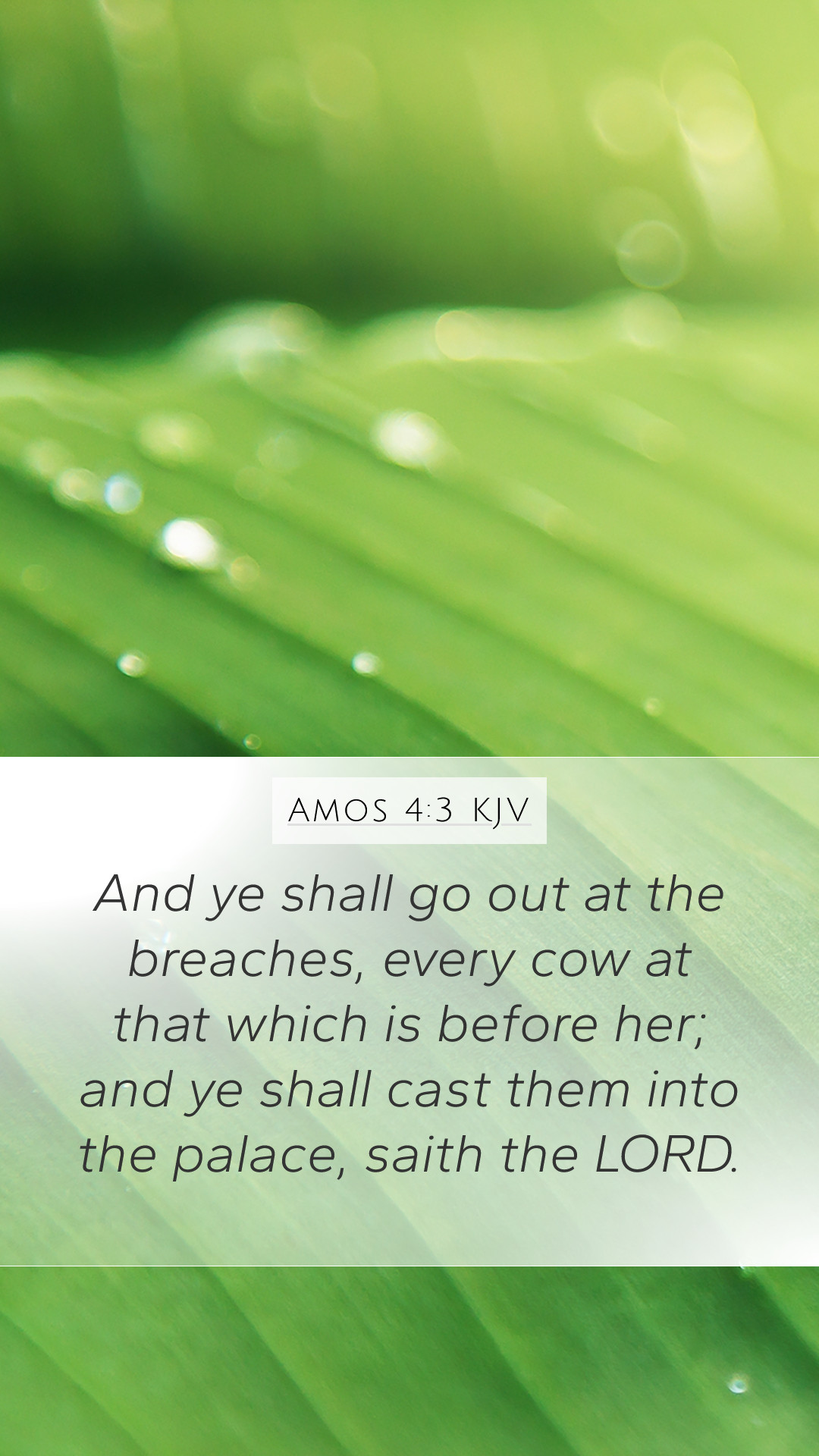Old Testament
Genesis Exodus Leviticus Numbers Deuteronomy Joshua Judges Ruth 1 Samuel 2 Samuel 1 Kings 2 Kings 1 Chronicles 2 Chronicles Ezra Nehemiah Esther Job Psalms Proverbs Ecclesiastes Song of Solomon Isaiah Jeremiah Lamentations Ezekiel Daniel Hosea Joel Amos Obadiah Jonah Micah Nahum Habakkuk Zephaniah Haggai Zechariah MalachiAmos 4:3 Meaning
What is the meaning of Amos 4:3?
And ye shall go out at the breaches, every cow at that which is before her; and ye shall cast them into the palace, saith the LORD.
Amos 4:3 Bible Verse Meaning
Understanding Amos 4:3: A Comprehensive Commentary
Amos 4:3 states, "And ye shall go out at the breaches, every cow at that which is before her; and ye shall cast them into the palace, saith the Lord." This verse encapsulates a profound warning and serves as a prophetic declaration regarding the fate of Israel due to their persistent unfaithfulness and oppression. Below, we provide a detailed analysis of its meaning using insights from various public domain commentaries.
Context of the Verse
In understanding this verse, it is imperative to consider the broader context of the book of Amos, which addresses the social injustices and moral failures of Israel. The prophet Amos, an outsider to the prophetic traditions of Israel, delivers God's message concerning impending judgment.
Verse Breakdown
-
Go out at the breaches:
Matthew Henry interprets this as a metaphorical image indicating how the wealthy women of Samaria would be taken out through the breaches caused by an invading enemy. They will be treated like cattle driven out in haste, showing God's judgment on their complacency and excess.
-
Every cow at that which is before her:
Albert Barnes emphasizes that this phrase illustrates chaos—cows rushing out in fear. This chaos signifies the breakdown of society and the loss of control that will accompany God's judgment. The imagery of cows also reflects the lifestyle and indulgence of the people in times of peace and plenty.
-
Cast them into the palace:
Adam Clarke notes that this describes the fate of the captives who would be thrown into the royal palace as spoils of war. It signifies the dishonor and despair that would come upon the leaders of Israel, especially those who lived in luxury while ignoring the cries of the oppressed.
Theological Implications
This verse highlights the severe consequences of sin. Israel's unfaithfulness through idolatry and social injustices warranted divine retribution, which Amos proclaims to a reluctant people. It serves as a reminder that judgment can manifest even within a chosen nation when they stray from God's commandments.
Key Themes
-
Divine Judgment:
The overarching theme in this excerpt is the certainty of judgment—illustrating how God’s discipline can come in the form of external threats or oppression.
-
Social Justice:
Amos advocates for social justice, emphasizing the need for accountability among those in power. Their privilege is starkly contrasted with the suffering of the marginalized.
Application and Relevance
The application of Amos 4:3 extends to contemporary society, where social injustice and moral complacency still prevail. It challenges believers to reflect on their roles in advocating for justice and caring for the marginalized in their communities. Moreover, it invites individuals and Bible study groups to engage in discussions about how to apply the lessons of these prophetic warnings in today’s context.
Cross References
- Isaiah 5:13: This passage underscores the concept of exile as a form of judgment due to a lack of understanding and the complacency of God's people.
- Micah 3:1-3: Here, the prophet condemns corrupt leaders, emphasizing their role in the oppression of the poor, aligning with Amos's theme of social justice.
- Ezekiel 12:3: This verse asserts God’s intent to highlight the impending disaster, linking back to the assurance of divine retribution and the fate of the Israelites.
Conclusion
In summary, Amos 4:3 serves as a potent reminder of the consequences of turning away from God's commandments. The clever use of imagery and powerful themes makes this verse a rich source for Bible study insights. As believers engage in online Bible study or group discussions, the layers of meaning in such verses invite a deeper exploration of Scripture.
Thus, our understanding of this passage not only enhances our knowledge of Scripture but also motivates us towards active application in our lives, helping us remain vigilant against social injustices and spiritual complacency.


